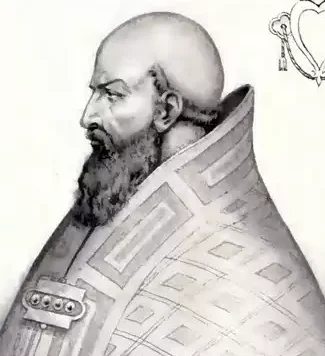
Pope Stephen IV, born in 770 and departing in 817, served as the Bishop of Rome and thus the head of the Catholic Church. His papacy, commencing in 816 and concluding with his demise in 817, was notably brief but impactful, particularly due to his significant interactions with the Frankish kingdom. This pivotal period in the Church’s history saw a deepening of political and religious ties between the Papacy and the Frankish rulers, laying the groundwork for future ecclesiastical and secular alliances.
Ascension to Papacy and Early Reign
The ascension of Pope Stephen IV to the papal throne marked a continuation of the close relationship between the Papacy and the Frankish kingdom. His election, following the death of his predecessor, Pope Leo III, was a crucial moment in the history of the Church. The early reign of Pope Stephen IV was characterized by his immediate engagement with Frankish politics, a move that was both strategic and necessary given the political landscape of the time.
The pontificate of Pope Stephen IV was distinct for its active involvement in secular matters, particularly those concerning the Frankish kingdom. This involvement was not merely a matter of choice but a necessity, as the stability and influence of the Papacy were closely intertwined with the fortunes of the Frankish rulers. His early decisions and actions were indicative of a Pope keenly aware of the delicate balance between spiritual leadership and temporal power.
Relations with the Frankish Kingdom
Pope Stephen IV’s papacy is most remembered for its strong ties with the Frankish kingdom. His relationship with the Frankish rulers was not only a continuation of the policies of his predecessors but also an expansion of the Papacy’s role in European politics. This relationship was multifaceted, involving diplomacy, mutual support, and a shared vision for the Christian West.
Under Pope Stephen IV, the bond between the Papacy and the Frankish kingdom strengthened significantly. This was evident in his correspondence with Frankish leaders, his involvement in the political affairs of the kingdom, and his role in shaping the religious landscape of the era. The Pope’s approach was one of pragmatic engagement, recognizing the mutual benefits of a strong alliance with the Frankish rulers.
Ecclesiastical Reforms and Influence
During his papacy, Pope Stephen IV also focused on ecclesiastical reforms, emphasizing the need to strengthen the Church’s spiritual and administrative structures. His reforms were primarily aimed at enhancing the discipline and moral integrity of the clergy, which was crucial for maintaining the Church’s authority and influence. Moreover, Pope Stephen IV sought to solidify the liturgical practices, aligning them more closely with Roman traditions, thereby fostering a sense of unity and identity within the Church.
His influence extended beyond mere administrative reforms; Pope Stephen IV was instrumental in advocating for the Christian faith’s expansion, particularly in regions under Frankish control. His vision for a unified Christian Europe was a driving force behind his ecclesiastical policies and his interactions with the Frankish kingdom.
Legacy and Impact on the Church
The legacy of Pope Stephen IV is one of a pragmatic leader who navigated the complex interplay of religious and political power with astuteness. His short papacy left a lasting impact on the relationship between the Papacy and the Frankish kingdom, setting precedents for future popes. His diplomacy and strategic alliances played a significant role in shaping the political landscape of Europe and the direction of the Catholic Church.
Pope Stephen IV’s tenure, although brief, was marked by significant decisions and actions that resonated through the subsequent centuries. His ability to balance the spiritual responsibilities of the Papacy with the temporal demands of the era was a testament to his leadership and foresight.
In conclusion, Pope Stephen IV’s papacy, though short-lived, was a period of significant importance in the history of the Catholic Church. His strong relations with the Frankish kingdom not only shaped the political landscape of his time but also influenced the future course of the Church. His efforts in ecclesiastical reforms and his strategic approach to leadership left a lasting legacy, underscoring the crucial role of the Papacy in the broader context of European history.
References
- “Pope Stephen IV,” Britannica, Accessed 23 December 2023.
- “The Frankish Kingdoms under the Carolingians,” by Rosamond McKitterick, Longman, 1999.
- “The Lives and Times of the Popes,” Internet Archive, Accessed 23 December 2023.
- “The Papacy: An Encyclopedia,” edited by Philippe Levillain, Routledge, 2002.
